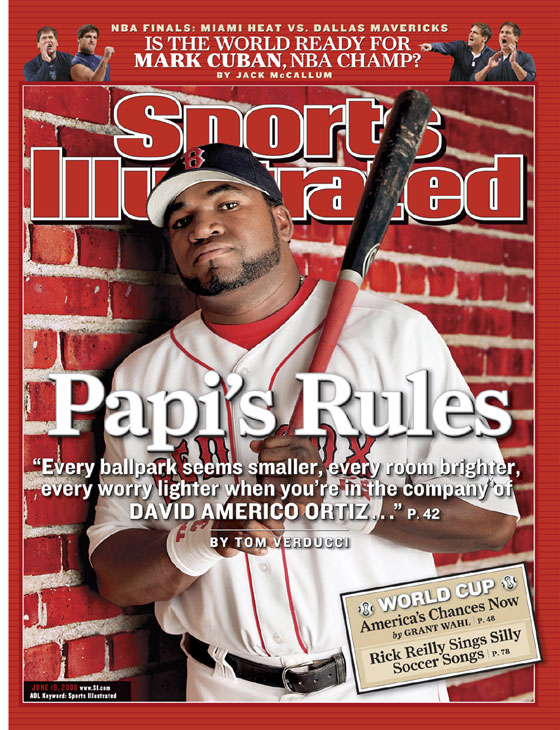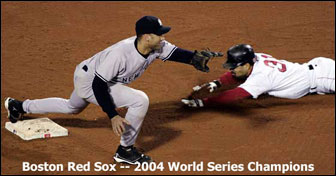Ortiz Illustrated
Ortiz Illustrated
|
|
|
(Clay Patrick McBride / Sports Illustrated Photo) |
Tom Verducci's column in the June 19, 2006 issue of Sports Illustrated
(republished with SI's permission)
Who’s Your Papi?
What drives David Ortiz, the supersized Red Sox slugger, is his resentment of the ball club that did him wrong…and the fighting spirit of his late mother, Angela Rosa
Every ballpark seems smaller, every room brighter, every worry lighter when you’re in the company of David Americo Ortiz, the friendly galoot of a designated hitter for the eternally grateful Boston Red Sox. In girth and mirth Ortiz evokes Babe Ruth, Santa Claus and your favorite stuffed animal from childhood. The only son of Enrique and Angela Rosa Ortiz—“I’m my mom’s baby boy, you know?” he says proudly—grew up loved in Santo Domingo, D.R., and seems intent on loving the world back.
Runyon or Twain might have invented a character like Ortiz, if it were possible for even such expansive imaginations to conjure a 230-pound teddy bear who speaks like a California surfer with a thick Spanish accent; a Dominican who married a Wisconsin girl and has wintered part time in the state; a hip-hop, bling-covered fashion plate who underneath his cool threads wears black boxer shorts with who’s your daddy? printed in all directions in Day-Glo colors; and—most amazing of all—one of the game’s great sluggers, who, at 27, was released by the Minnesota Twins after no other major league club wanted him in a trade.
Ortiz, now 30, ranked fourth in the American League in home runs (18) and first in RBIs (56) at week’s end, a pace that would leave him with 48 homers and 149 RBIs for the season and a three-year run in which he had no fewer than 41 homers and 139 RBIs. Only two players in history maintained such high production for three consecutive seasons: Ken Griffey Jr. (1996 through ’98) and Ruth, who did so for six straight years (1926 through ’31). A .300 hitter last season, Ortiz was batting .265, blaming the drop partly on the extreme defensive shifts employed against him (right).
In Ortiz there is a little bit of something for everyone to like, which helps explain why he received more All-Star votes from major league fans than any other player last year; why his Boston Red Sox teammates, in one of the more respectful acts in clubhouse culture, ceded him total control of the stereo; and why a terminally ill eight-year-old boy, given days to live, asked to visit Fenway Park to meet him in April. Ortiz’s popularity, like his gap-toothed, omnipresent smile, crosses cultures and generations.
“He appeals to every demographic,” Red Sox general manager Theo Epstein says. “People love watching athletes who you can tell enjoy what they’re doing. And to have a guy who comes to work every day with a smile—that’s especially huge in our clubhouse, where we had problems in the past.”
Says Puerto Rican–born teammate Alex Cora, “People love to be around David. The unique thing about him is that he communicates just as easily with the American players as with the Latin players. Most of the Latin stars don’t have that quality. He brings the team together.”
Ortiz thrives on such interaction, preferring to spend as much time as possible around friends and family. Yes, he is outgoing by nature, but the company also keeps him from the dark thoughts that plague him sometimes when he is alone. Behind the smile there is pain. “I start thinking about life after death,” Ortiz says. “I’ve got to quit thinking about it because it’s very deep. Very deep. Sometimes you start thinking about it, and you don’t feel like you want to be alive, so I don’t like to get all quiet.
“Everybody goes through some tough times in their life, no matter what you do. Man, I’ve had my tough times.”
Eight minutes. Ortiz remembers it as exactly eight minutes. It is all the time needed for an elite runner to cover two miles, for an orchestra to play the second movement of Brahms’s Symphony No. 1 or, as Ortiz found out, for your heart to break. On New Year’s Day 2002, it was eight minutes from that awful phone call from his sister’s boyfriend—Your mom has been in an accident—to the time Ortiz arrived at the roadside wreck near his home in Santo Domingo. A dump truck. His mom’s car. And Angela Rosa ... gone.
“I was there eight minutes after it happened, and she was dead already,” Ortiz says. “That’s why I don’t worry about baseball. I don’t feel like I put any pressure on myself when I’m playing baseball. Not after that.”
Ortiz was 26 years old at the time and still trying to establish himself as an every-day player with the Twins, who had plucked him from the Seattle Mariners’ farm system in 1996, in one of those pennant-race deadline deals in which the anxious Mariners wanted veteran third baseman Dave Hollins. At the end of the ’97 season Ortiz was promoted to the big leagues, and the first person he called was, of course, Angela Rosa. She and Enrique, whom everyone calls Leo, were always there for him. There was the day Leo, who sold auto parts, left work to watch his boy play Little League for the first time. David smacked a home run, and as he rounded third, Leo bolted from the stands and interrupted his son’s trot to home by throwing a big hug around him. Though David still visits Leo regularly in Santo Domingo, things will never be the same without Angela Rose.
“She was one of the best mothers ever,” Ortiz says. “She was pretty much my everything. It’s tough, man. I come from a poor family, but I had a good education and a good home. That counts for everything. My mom, she wasn’t like a baseball mother who knew everything about the game. She just wanted me to be happy with what I was doing.”
Both his parents, Ortiz says, stressed the importance of education, but it was Leo, a former semi-pro ballplayer, who advised David to give up his other love, basketball, to concentrate on baseball. It was baseball that brought Ortiz to Wisconsin in 1996, where, while playing Class A ball at age 20, he met his wife, Tiffany, and started a family that includes two daughters, Jessica, 9, and Alexandra, 5, and a son, D’Angelo, 1 1/2.
The year that began with his mother’s death, 2002, would also be Ortiz’s last with the Twins. He hit .272 with 20 home runs and 75 RBIs platooning at first base for a young team that reached the AL Championship Series. Minnesota, though, was not high on Ortiz, who seemed injury-prone (he missed chunks of time with wrist and knee injuries), was not a polished fielder and couldn’t catch up with good fastballs on his hands. Minnesota G.M. Terry Ryan figured that Ortiz’s development had stalled and decided to trade him. “He just wasn’t getting it done here, for whatever reason,” Ryan says. Then he admits, “I made a bad baseball decision.”
He wasn’t alone. Ryan tried to trade Ortiz for two months. “Not one team made an offer,” Ryan says. “Nothing.”
Finally, in December 2002, the Twins released Ortiz. Finding a job at that point of the off-season looked so difficult to him that he told his agents, Fernando Cuza and Diego Benz, to check for openings in Japan and Mexico. “[The Twins] did me that bad,” Ortiz says. “I never had a problem with anybody in that organization. Ever, bro. I was a good teammate. I respect everybody. I never had no argument with no coach, nobody. I never did anything wrong, but they did me wrong. No respect, bro. I was lucky I got a job with the Red Sox. There were other teams, but they were offering me way less money.”
The Red Sox gave him $1.25 million and figured he was one of five guys—along with Jeremy Giambi, Shea Hillenbrand, Kevin Millar and Bill Mueller—who would combine to fill three spots (first, third and DH). Six weeks into the season Ortiz showed so little power (two homers) that his teammates were calling him Juan Pierre (the light-hitting leadoff man who’s now with the Chicago Cubs). Ortiz wanted out of Boston. “I called my agents,” he recalls, “and said, ‘If you guys are not here tomorrow, you guys are fired.’”
After the next day’s game Ortiz and his agents met with Epstein in the players’ parking lot outside Fenway Park. “I told Theo, ‘I want you to trade me or release me,’” Ortiz says. “‘I can’t be sitting here watching this circus anymore, guys I know I can do better than. Me just watching from the bench? I’m not that kind of guy. I don’t clap for something that doesn’t deserve it.’”
“Give me a couple of days,” Epstein recalls saying. “I promise you we’ve got something in the works to free up a spot for you.”
On May 29, 2003, Epstein traded Hillenbrand to the Arizona Diamondbacks for righthander Byung-Hyun Kim, a forgettable trade for Boston except for the opportunity it gave Ortiz. Finally, he could smile.
Ortiz had felt stifled in Minnesota, an organization that so emphasizes situational hitting that no Twin has hit 30 home runs in a season since 1987. The 6'4" Ortiz was the square peg who didn’t fit in the round hole. “They wanted me to stay inside the ball,” Ortiz says, referring to a style in which a lefthanded hitter tries to hit inside pitches to leftfield. “They were teaching that to everyone. That’s why nobody ever hits home runs there. But when you’re young in the big leagues and the coach tells you to do something and you don’t do it and you get negative results, then you’re f-----. They’re going to sit you down.”
The Twins, Ortiz says, so enthusiastically stressed small-ball tactics such as hitting behind runners that “if you moved the runner over from second base [with a groundout], you got high fives in the dugout like you just hit a home run.”
In his first at bat with the Red Sox, while batting cleanup in a spring training game, Ortiz happened to come up with a runner on second base and no outs. “I came in with that little pull, cheap-shot s---,” said Ortiz, explaining his grounder to second base on an outside sinker. “I still had the Minnesota Twins in my system.”
This time there were no high fives waiting for him in the dugout, just manager Grady Little with a word of advice. “Hey,” Little said. “Next time? Bring him in.”
Ortiz smiles at the memory. “I was like, O.K.!” he says. “I had a little more freedom than what I was used to.”
Says Epstein, “We didn’t know what we were getting. Nobody knew. We just let him be exactly what he is.”
Ortiz, with a mechanical tune-up from hitting coach Ron Jackson, and freed of the wear and tear of playing in the field, started turning on inside pitches and closing that hole in his swing on inside fastballs. From June 1, 2003, through June 1, 2006, he slammed 132 home runs, second only to Albert Pujols’s 140 in the majors. He finished fifth, fourth and second in AL MVP balloting in the past three seasons while conjuring up so much late-inning magic—he has 13 walk-off hits with the Red Sox, including three in Boston’s 2004 postseason run to a world championship—that last year the team presented him with a plaque declaring him THE GREATEST CLUTCH HITTER IN THE HISTORY OF THE BOSTON RED SOX. Ortiz lived up to that billing on Sunday, hitting a three-run walkoff homer at Fenway to beat the Texas Rangers 5–4.
“He loves coming up in the big spot,” says Epstein, whom Ortiz has persuaded to junk the sabermetrics principle that clutch hitting is not a skill. “He makes you rethink the objective analysis. The way he rises to the occasion and the quality of his at bats, the numbers don’t reflect that human element.”
Says Ortiz, “It’s mostly confidence. If you go up there thinking you might not get it done, you’re out already. I know I’m going to hit you. And I have confidence all around me here. In Minnesota, if we faced a good pitcher, guys would say, ‘Oh, well, I’ll get my hits tomorrow.’ Here? We don’t care who’s pitching.”
Ortiz is an icon in Boston already. “A larger-than-life figure,” says second baseman Mark Loretta of the man called Big Papi. (Ortiz, forgetful of names, has a habit of calling people Papi, a Spanish colloquialism for daddy or pop. His frequent use of the word was turned around on him long enough ago that he can’t remember when it began.)
Ortiz’s transformation from released player to, as Toronto Blue Jays G.M. J.P. Ricciardi says, “a Hall of Famer with five more years like this” may be unprecedented. The Brooklyn Dodgers lost Roberto Clemente to the Pittsburgh Pirates in the mid-1950s version of the Rule 5 draft, but no other hitter this good has ever been willingly cut loose.
The Red Sox this spring signed the former castoff to a four-year, $52 million extension, keeping him in Boston through 2010. It’s just another reason why Big Papi is smiling. “I’m not going to lie, I got frustrated a lot before [Boston],” Ortiz says. “It’s been tough. The worst was losing my mom. Losing her was something I couldn’t figure out at the time. I was, like, lost and confused.
“When things weren’t going good, she would always say, ‘Son, you’re always going to be my baby boy. Keep fighting. I love you.’ Now, even though I don’t have that voice, I feel that spirit to fight back when times are tough. My mom, she’s still always there for me. Always.”
▀ Sports Illustrated | June 19, 2006 -- Who's Your Papi? By Tom Verducci








